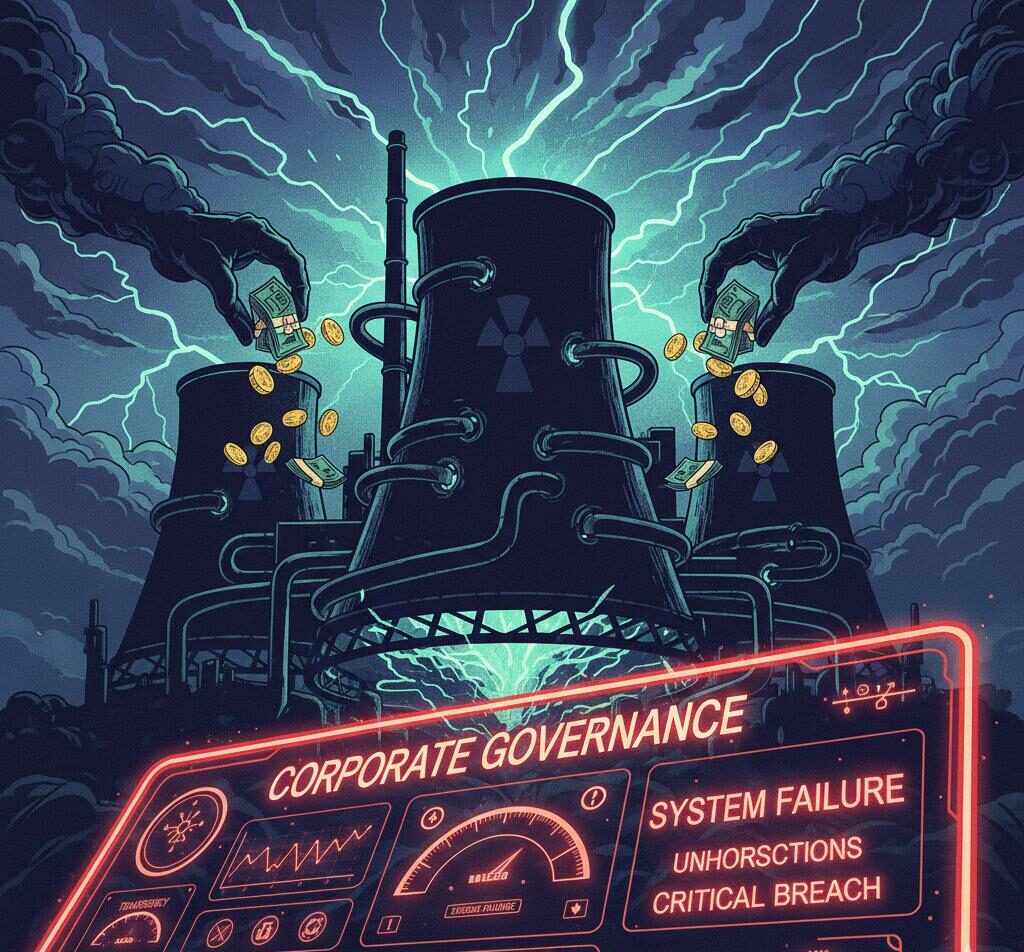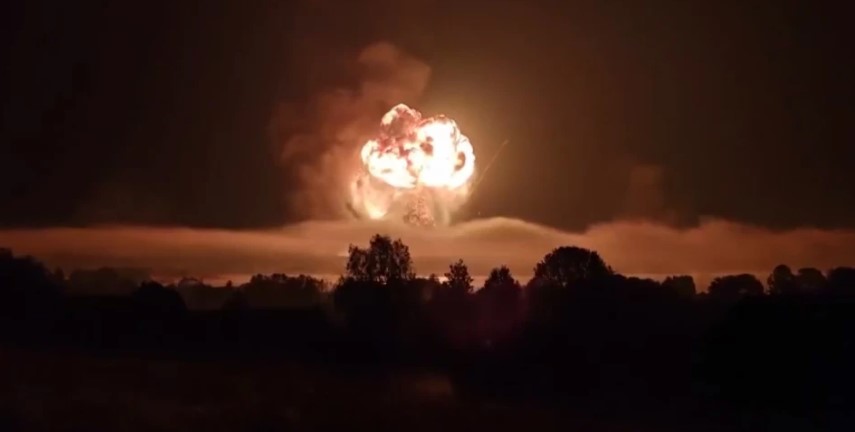Ukraine’s quick fix for Energoatom scandal may gut critical reforms

Operation Midas revealed a systemic management failure at Energoatom, one of Ukraine’s largest state companies. But things can get much, much worse.
How the government responds will determine if this scandal only affects the nuclear operator, or every other state company, destroying years of hard-won reforms that tried to lift Ukraine out of its Soviet past. For now, the government is not off to a great start.
Prime Minister Yuliia Svyrydenko announced three decisions after news of the corruption scandal broke:
- Energoatom’s supervisory board was fired without following the legal framework
- The Ministry of Economy was told to find new board members in just a week
- An urgent audit of Energoatom was launched
However, it later emerged that another decision was adopted on the same day, without being announced — effectively nullifying independent performance evaluation for supervisory boards of all strategic state-owned enterprises (SOEs), not just Energoatom.
These steps, in combination, raise serious concerns that a reform rollback is possible. If that happens, it can lead to more political meddling at SOEs, paving the way for a new wave of systemic scandals in the future.
This can weaken the greatest pillars of Ukraine’s economy during a time of war, compromise the country’s future recovery, erode its integration into the EU, and make it more like Russia, something that thousands of volunteers fought tooth and nail to prevent.
Corporate governance reform is meant to fix Ukraine’s post-Soviet dysfunction
Energoatom runs the nuclear plants and is responsible for more than half of the country’s power generation.
Like other strategic SOEs, Energoatom went through corporate governance reform in 2023 and 2024, to establish efficiency and transparency. Part of this reform involved creating a supervisory board — the first one Energoatom had in history.
This was supposed to break Ukraine's Soviet legacy of state enterprises where ministers acted as owner, manager, and controller simultaneously — a system where only 15% of Ukraine's 3,100 state enterprises turned a profit, while the rest accumulated $16.7 billion in debt between 2018 and 2023.
The 2024 reform, a prerequisite for EU membership and IMF funding, aimed to replace political appointments and extraction schemes with independent boards selected through transparent competition. It was meant to finally complete what reformers started in 2014.
The failures of Energoatom’s supervisory board
For Energoatom, proving Ukraine could manage strategic assets to OECD standards is essential for attracting the billions in reconstruction investment the country desperately needs.
In theory, the system should work as follows: the state sets strategic goals and appoints a supervisory board to ensure their implementation. The board hires and oversees management. The state then evaluates whether the board has fulfilled its mandate.
In practice, however, the board’s independence was compromised from the start.
Despite official statements denying political interference, real events suggested otherwise. A six-month delay in signing contracts with newly elected board members — which prevented the board from starting its work — led to the resignation of independent member Timothy Stone.
As a result, the supervisory board never obtained the legally required majority of independent members. And it subsequently failed in its responsibilities:
- Controlling management activities: Regular reporting, risk assessment, and personnel decisions are basic tools the board should have applied.
- Establishing an effective internal control system: Compliance, risk management, and internal audit mechanisms at Energoatom proved ineffective. For example, if the whistleblowing mechanism had functioned properly, the so-called “bar gate scheme,” in which officials stole $100M of state money through kickbacks, could likely have been detected much earlier.
- Ensuring transparency: The suspension of financial and non-financial reporting during wartime — although justified as protection from external threats — effectively facilitated internal abuse by corrupt officials.
Members of supervisory boards at SOEs must fully understand their fiduciary duties.
If a board cannot explain what it has done over the past year to prevent or detect corruption schemes in a company long associated with scandals — and provides only vague general statements — this indicates a lack of due care.
As such, the Ministry of Economy’s position that the supervisory board “was not involved” in the actions under investigation seems unclear. While board members were not beneficiaries or perpetrators of the corrupt schemes, their core responsibility was precisely to ensure such schemes could not occur.
Even more contradictory is the Ministry’s claim that this board “helped establish modern corporate governance processes.” If large-scale corruption was allowed to flourish, it is difficult to describe the system as modern or effective.
A comparison with the banking sector is instructive: managers and board members whose banks collapse lose their impeccable business reputation and are barred from similar positions. At Energoatom, however, the board under whose watch corruption thrived was essentially thanked for “building modern corporate governance.”
Throwing the baby out with the bathwater
One of the government’s first reactions to the scandal was to prematurely terminate the powers of this board.
At first glance, this may seem logical: the board is the key element of the corporate governance system and is accountable to the state as the owner.
However, the way the government went about it — firing from the hip while ignoring legal procedures —may suggest that it’s more interested in sweeping the problem under the rug than solving it.
1. The premature dismissal of the board
The Law On the Management of State Property Objects contains an exhaustive list of grounds for early dismissal of supervisory board members.
Nothing on that list says you can fire the board based on a subjective assessment of ineffectiveness.
The decision must rely on a formalized performance evaluation. Since no proper evaluation was conducted, the government likely lacked legal grounds for the dismissal.
Even the government’s amendments adopted on 11 November, allowing evaluations to be conducted solely by Energoatom’s owner (the Cabinet of Ministers through the Ministry of Economy) — without independent consultants — do not eliminate the requirement to actually perform the evaluation.
Under the legally-mandated procedure:
- All board members must complete questionnaires
- Company data must be analyzed
- Each element within the scope of evaluation must be given a score
- An action plan to fill identified gaps must be prepared
- Board members must be allowed to give their explanations
None of this could reasonably have been completed in a single day. The absence of a published evaluation report, which is explicitly required by law, further indicates that the evaluation did not take place.
If this violation of a core reform safeguard is ignored, protection of SOE supervisory boards from political interference will collapse. If Energoatom’s board can be dismissed in this manner, any SOE board could be dismissed next, regardless of objective justification.
2. Appointment of a new supervisory board in one week
The Ministry of Economy stated that, in coordination with G7 partners, it would propose a new board composition within a week.
However, the procedures established by law and Cabinet resolutions 142, 143, and 777 require:
- a formal decision to launch the selection;
- competitive selection of a recruiter;
- publication of candidate requirements;
- acceptance and evaluation of applications;
- shortlisting by a nomination committee;
- Cabinet approval.
This process typically takes at least three months. Completing it in seven days is not realistic under current rules.
Some stages may be accelerated in exceptional circumstances, but bypassing transparency and competition is not flexibility — it is regression. Transparent, merit-based selection is a cornerstone of sound corporate governance. Any informal or opaque approach will further erode trust.
The inconsistency is striking: the government can amend resolutions overnight when it seeks to weaken transparency (as with the evaluation procedure), yet has failed for months to approve reforms aimed at strengthening selection rules — despite these being legal obligations and long-overdue IMF benchmarks.
This explains why official claims of “commitment to reform” now face skepticism.
3. Dismantling the supervisory board performance evaluation mechanism
A key win of the 2024 reform was the introduction of regular performance evaluations of SOE supervisory boards. The law required the Cabinet to define procedures and specify cases where an independent consultant is mandatory.
The core principle was clear: board effectiveness must be assessed based on objective evaluation, not political judgment.
However, on 11 November, the government decided that, during martial law, evaluations will be conducted solely by the ministry that owns the SOE.
This enables ministries to unilaterally determine supervisory board effectiveness without independent oversight.
This marks a return to direct state control over these companies. Any supervisory board can now be dismissed at a ministry’s discretion — a practice common before the 2024 reform.
Also, the legality of the amendment is highly questionable. The 2024 reform law clearly defines the list of exceptions allowed during martial law — and none of them involve evaluating a supervisory board’s performance.
Reform on the brink
Corporate governance cannot be strengthened by methods that undermine its core principles: procedural integrity, transparency, and independence.
Operation Midas demonstrated that Ukraine still operates within a framework of simulated corporate governance.
The reform will become real only when:
- Supervisory boards are held personally accountable for their actions and inaction;
- Transparency and accountability of SOEs and managerial decisions are ensured;
- The government refrains from political interference in corporate processes.
Violating established rules in pursuit of a “quick result” is not reform — it is dismantlement. Unless these decisions are reversed, Operation Midas will be only the first in many similar scandals to come.



